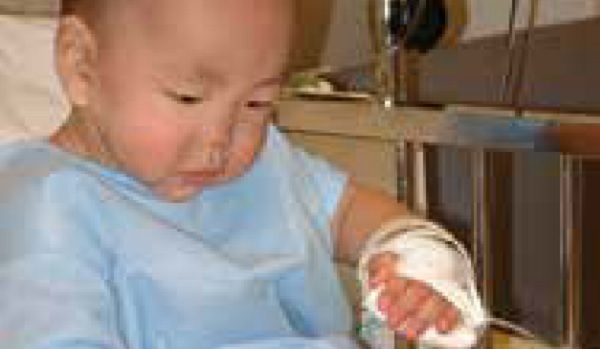Winter night, a special gift
【Christmas Love Song】2

We are all mothers who were originally going to Italy but accidentally landed in the Netherlands, learning to appreciate this special gift God has given us.
On Christmas Eve in 2006, a roaring ambulance drove Mu'er, who was suffering from epilepsy again and had weak breathing, to the hospital. I followed the ambulance and rushed past, ignoring the obstruction of the red light. Fortunately, people were sleeping soundly at that time, and there was nothing moving in the street except for the dancing snowflakes.
Mu'er suffocated immediately when she was born. After rescue, she saved her life. In the following days, she often stopped breathing. She underwent an operation two months ago. The breathing disorder was relieved, from about 80 times of suffocation per day to about 10 times per week. three times.
The doctor said that Mu'er was like a jigsaw puzzle, with new conditions constantly appearing, forcing doctors to piece them together. Each condition was related to breathing: esophageal reflux, dysphagia, asthma, sleep apnea, epilepsy, and further caused by hypoxia. Cranial nerve damage has resulted in comprehensive developmental delays, and recently he has been found to have autism tendencies.
Mu'er is alone in the emergency room
When two-year-old Mu'er arrived at the hospital, she was still unconscious and twitching. Her whole body was as hot as a fireball, and her body temperature rose to 105 degrees Fahrenheit. What was even worse was that after three nurses were changed and more than a dozen needles were inserted, she still couldn't find her. Mu'er's blood vessels. Every time a needle was inserted, Mu'er trembled violently in her coma, and my heart ached like a needle pricking me. I kept complaining that these nurses were just doing it for a living. In desperation, in addition to calling on the Lord Jesus, she could only hold Mu'er's red face and cry stupidly, until a pediatric head nurse finally found the blood vessel and injected the medicine into Mu'er's body. The body temperature gradually dropped under the control of the medicine, and the monitor The respiratory index gradually returned to normal.
Transferred to the intensive care unit, there were only three patients in a dozen or so spaces separated by curtains. As soon as the nurse left, I noticed that Muer curled up into a ball, her back began to shake slightly, and her breathing became rapid, which was the same as usual symptoms before high fever and convulsions. I immediately rang the bell, and the nurse on duty was shocked when she saw this. She called the head nurse and immediately gave Mu'er anal antipyretic medicine. I put an ice towel on Mu'er's forehead, hugged his huddled body tightly, and while massaging his back, I kept praying with tears until his curled body gradually relaxed and became soft in my arms, hurriedly Breathing also stabilizes.
The hospital is close to the city center, and the layers of high-rise buildings are shining with holiday brilliance. It is projected through the gaps in the windows, and there seems to be vague Christmas music floating in the ears. Are the husband and the other two sons busy decorating the Christmas tree? Or hold hands and pray for Mu'er? Looking back on the Thanksgiving and Christmas of the past two years, I spent all the time in the emergency room with Mu'er. I couldn't feel the joy of the festival at all. Instead, I cried on this day of universal celebration.

▲When Muer was one year old, she was hospitalized due to acute pneumonia and epilepsy. This photo was taken the day before she was discharged.
God gives special gifts
Since Mu'er was born, my heart has always been gripped by a kind of panic, torn apart by the struggle of Mu'er's life. I have asked God countless "whys" but never received an answer. Mu'er was pushed into the operating room time and time again, frothing at the mouth and fainted time and time again. He was often stuck with countless needle holes from head to toe. Food was injected through the stomach tube every day. He was taken to receive physical therapy, occupational therapy and speech therapy every week. It was difficult. They try to learn things like crawling, sitting, eating, and talking that most children can naturally do, but with little effect. The physical therapist even said tactfully: "Your child is just lying there crying. Even candy can't tempt him to crawl. It's just a waste of money and time for him to come to treatment."
For two years, I interrupted seminary studies, stopped serving in the church, gave up reading and writing, and exhausted my physical and mental energy. But he will never be able to live like a normal child. When will the long dark night with no hope come to an end? I couldn't help but burst into tears.
"Are you sad and helpless?" A voice sounded from my ear.
My crying alarmed a mother next door. After taking a closer look, I actually knew each other. We had attended the "Parent Speech Therapy Support Course" together. She was a university professor. After many years of marriage, she gave birth to twins with Down syndrome. She has two children, both of whom have cardiopulmonary disease and developmental delays. In order to fully take care of her children, she quit her job and learned sign language, basic nursing and other skills. The children are now five, and yesterday her son was hospitalized with acute pneumonia.
She moved a chair and sat down opposite me: "Have you read an article called "Welcome to the Netherlands"?"
I nodded. It was an article written by a children's playwright about her experience raising a son with Down syndrome.
She continued: "We are all mothers who were originally going to Italy but accidentally landed in the Netherlands. We have to learn to appreciate this special gift God has given us." In the dim light, I saw the cross on her chest flickering.
When she left, she patted me on the shoulder and said, "God has a good intention in giving such children to us, because He will give us more love and grace. For one day in our hands, we will try our best to love them; if God takes them back, Just bless them.”
The next day, Mu'er's condition stabilized and she was transferred to the general ward, and she was ready to be discharged from the hospital on the third day. I went to say goodbye and thank her, but the hospital bed was empty. God took the child away last night.
I never saw her again, but I began to learn to appreciate the special journey of raising Mu'er.
